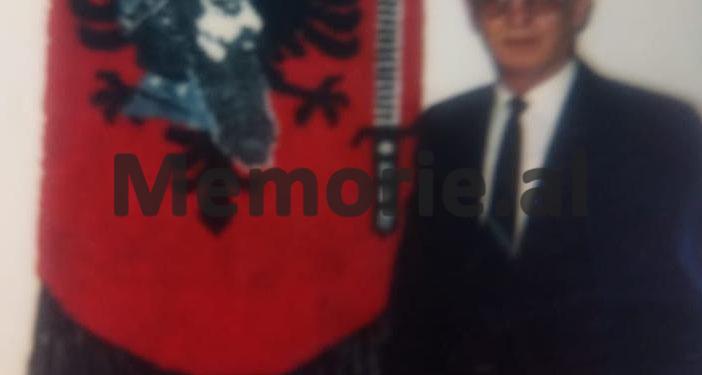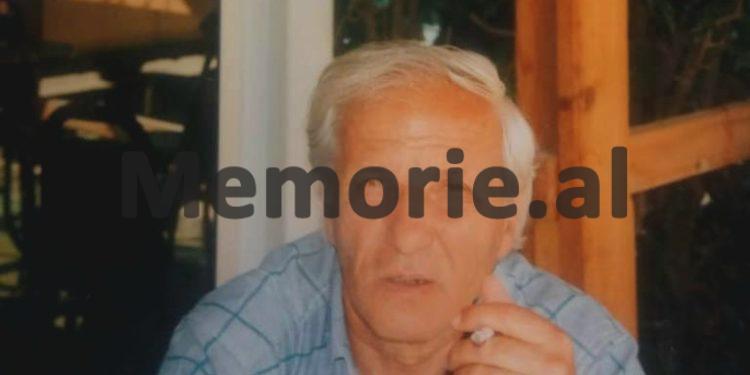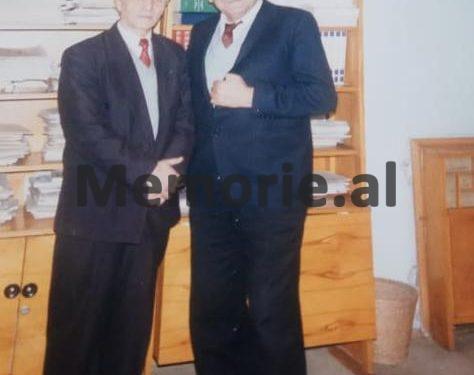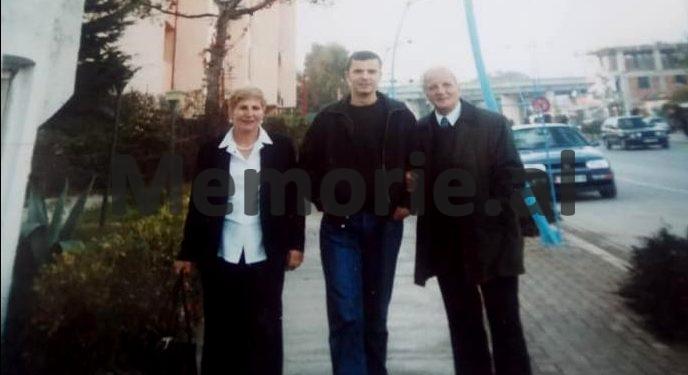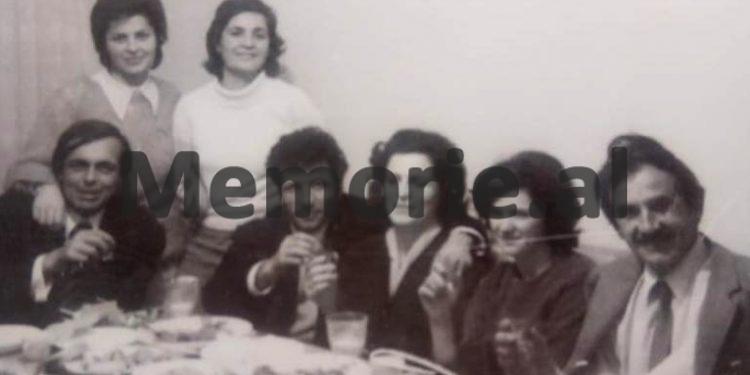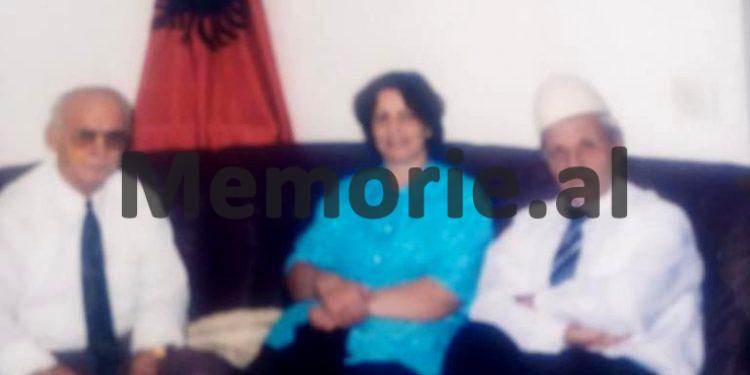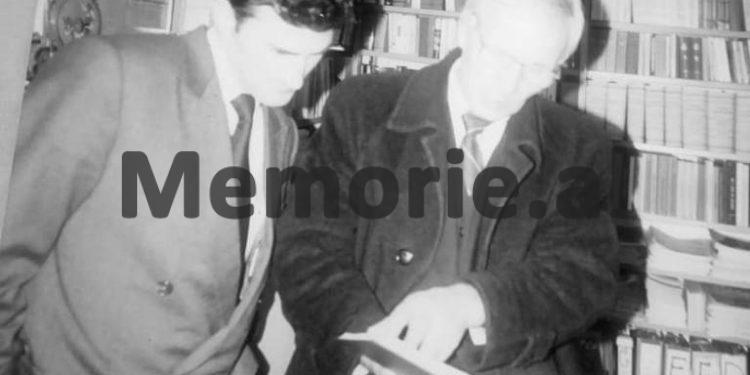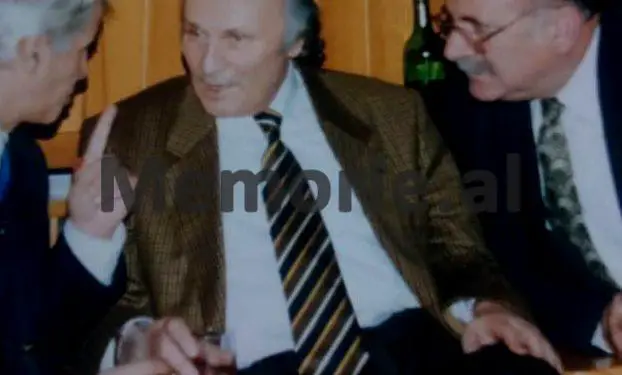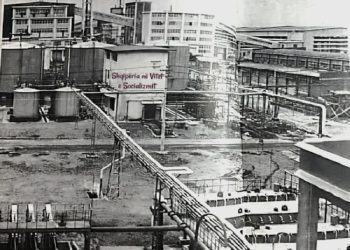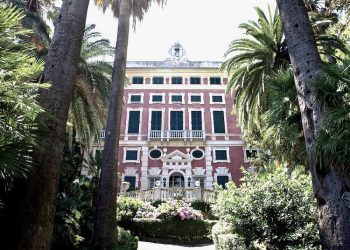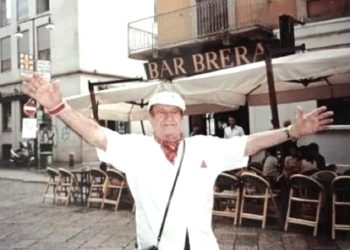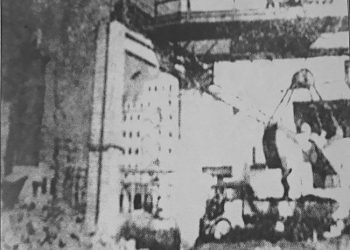Nga Esat Myftari
Memorie.al publishes the unknown story of Esat Myftari, originally from Peja, who was in high school benches when he was a member of a group of young boys who opposed the official Belgrade policy against the discriminatory policy against the Albanian population living in He started working as a journalist at “Rilindja” in Prishtina, from where he was proposed as a correspondent of the TANJUG Agency, but he refused and in 1963 he was forced to flee and come to Albania, with the aim of seeking help and support. from the mother country, for the clandestine organization of the “Boys of Peja”. Numerous vicissitudes in the mother country and continuous pursuit of the State Security since the time of studies in Tirana and the period when he served as an educator in the town of Shengjin and the villages of the Coast of Matë, where he was arrested in 1975, after he had officially requested repatriation to his homeland Kosovo, sentencing him to ten years in prison on charges of “agitation and prop agenda ”, which he suffered in the Spaç camp. The whole painful story of the journalist, publicist, researcher, translator, MP and diplomat, Esat Myftari, is described with a literary mastery in his book, “Your death, my life” an autobiographical novel that has just come out from the Publishing House “Lena Graphic Desing” of Prishtina, and with the permission of the author, will be published in parts by Memorie.al
The unknown story of journalist, publicist and writer Esat Myftari
Esat Myftari was born on June 16, 1940, in the city of Peja in Kosovo, where his family originally came from. He completed his first elementary school education, 7-year-old and high school, in his hometown, completing them in 1959. Also, in 1959, Esat, a 19-year-old boy, began his studies at the Faculty of Law of the University of Belgrade. In love with history and literature, he started writing at a young age when he was in the 7-year school benches and in the faculty period, he became a member of the Literary Club “Përpjekja” based in the Student City of “New Belgrade”. , where he affirms himself quickly and from time to time, writes poems and critical literary views, but because of their content, does not send them for publication.
In 1961, after successfully passing the relevant competition, Esat started working as a journalist in the daily of the province of Kosovo, “Rilindja”, where he is assigned to cover the chronicle of the city of Pristina and the Kosovo Trade Unions. In the same year, he was offered a qualification scholarship at the Yugoslav TANJUG Agency, with the prospect of becoming a correspondent outside the then Yugoslavia. But his joy at the scholarship that was destined to send him to the outside world was quickly dashed, as the specialization offered to him was conditional on his membership in the Communist League of Serbia, which 20-year-old Esat refused. categorically.
Meanwhile, in 1963, he participated in a group of young men who disagreed and were against the policy pursued by official Belgrade towards the Kosovo Albanians and wherever they were in their lands under Yugoslavia, and on behalf of the “Peja Clandestine Group”. , as their representative, crosses the border illegally and comes to Albania. Esat’s goal as a representative of the “Illegal group of boys of Peja”, was to establish contacts with the Albanian state and to seek various support and assistance for the well-functioning of that group of young boys, which aimed to resist the discriminatory policy of official Belgrade to the Albanian population in Yugoslavia.
In 1974, some members of this group were arrested by the official authorities of the Yugoslav Ministry of Internal Affairs, accused of participating in the events of 1964, when the Albanian national flags were unfurled in the main cities of Kosovo and when they were taken strict police and judicial measures against them. The main motto of this mass movement, which was the first of its kind in post-war Kosovo, was the unification of Albanian lands with their “mother” state, Albania.
Meanwhile, Esati, who was in Albania, as well as some of his Kosovar emigrant compatriots in Albania, gained a right to study and in 1965, he began his studies at the Faculty of Natural Sciences in Tirana, in the “Bio-Chemistry” branch. After the third year of studies, disappointed by the official policy of the communist regime of Enver Hoxha and the treatment of Kosovar emigrants in Albania, who upon their arrival in their homeland, it seemed that “from the rain they had heavy hail”, interrupts his studies and requests repatriation!
Of course, this was not approved by official Tirana and in 1969, Esat started working as a teacher in the 8-year school in the town of Shengjin, in the district of Lezha, where he worked until 1974, from where he was transferred to the village of Tale. of the Mata Coast, where he also worked diligently. As during the whole period, he was working and living in the district of Lezha, Esat was regularly monitored by all means by the State Security organs, even in the school where it was said that he had been sent on purpose, because they were afraid of an escape. his opportunity to go to Yugoslavia from Shengjin, he is arrested and sentenced to 10 years in prison, accused of “agitation and propaganda against the popular power”!
After serving his full sentence while serving his sentence in the Spaç camp, etc. (not benefiting from a single day of reduced sentence), Esat was released from political prison in 1985 and returned to the district of Lezha where he had worked and lived before the sentence and in 1986 , starts working as a worker in the Paper Factory in Lezha. That same year he started a family and then two sons were born.
In 1990, at the beginning of pluralism, Esat took an active part in the popular movements for the overthrow of the communist dictatorship in Albania and with the establishment of the branch of the Democratic Party for the district of Lezha, at the beginning of 1991, for his past and contribution. great at the beginning of those popular protests, he is elected secretary of that branch.
Also, as a result of that contribution, in the first pluralist elections of March 22, 1991, Esat was elected a member of the Democratic Party in the People’s Assembly, representing the voters of the Mata Coast, where he had worked as a teacher until the day of his arrest in 1975.
A year later, in the autumn of 1992, he was appointed Director of the Diaspora Directorate at the Ministry of Foreign Affairs of Albania, headed by the Minister, Alfred Serreqi. In that position, Esat worked diligently until 2000, when he was appointed diplomat at the Albanian Embassy in Riyadh, where he remained until his retirement.
Since that time, Esat has been devoted to his passion, writing, studies and translations and since 2011, he has started publishing several books, which have been welcomed by critics and readers, also because of their subject matter, as well as the variant of Gegërisht that he wrote them, which is very rare in Albanian publications of the mother country!
The first book published by Esat Myftari is “Emrush Myftari” (monograph), and after him come: “Kosovo and Enver Hoxha” (study), “Political profile of Esat Mekuli” (monograph), and “Your death, life ime ”, which is an autobiographical novel, where he has masterfully and chronologically described most of his life, from family and life in Kosovo as a high school student, escape to Albania, many vicissitudes from surveillance of State Security prosecution, arrest, investigation, trial and deportation to Spaç prison.
All the events and everything described in the book “Your death, my life”, are real and the characters there are presented with their concrete names and surnames, while only those people who badly affected his life, (mainly, those of bodies of the Ministry of Internal Affairs of that time, such as operatives, investigators, police officers, heads of the Ministry of Internal Affairs and the Branch of Internal Affairs of Tropoja, Lezha, witnesses in his trial, etc.), the author was has only changed the names, giving them their real surnames.
Continued from the previous issue
Excerpts from the book “Your death, my life”, author, Esat Myftari
– That indeed there will be no more mass conversions, but the multiplication of individual cases can be fed in a thousand and one ways, which would lead to a rough conclusion, if not identical.
Simon collected himself.
Excuse me, Ridwan, have you read the Qur’an?
– Yes, once, many years ago.
“I too have read the Bible in pieces,” said Simon.
– You see, then, we are in the same waters – said Ridvani with a laugh.
– Yes, exactly.
With my cellmate who asked me about the “February 4 Massacre”!
But Simon, it seems, had the tip of the reserve question:
– Do you not feel sorry for me when I ask you something else?
– Aspak.
– Why do they call you, Kosovars, treacherous people?! Could February 4 be the only cause of this?
Ridvan was stunned, not by the memory of a date like that, but by the wickedness he noticed in his eyes and the stench carried by the question suggestion.
– Simon, February 4 is elaborated in different ways, which seems to me to be nonsense. In official Albania, as I know, this date is remembered with regularity, dedication and fuss. On each anniversary they filled the newspapers with different stories. Even in Tirana, a street of the Bloc bears this name.
The other side says that that date is with intentionally spiritual figures, still not supported by concrete names, with cause-and-effect concealment and provocative intentions. According to the historian Ruzhdi Krasniqi of the diaspora, all these exaggerations are done for two basic reasons: first, to relativize the cooperation of Albanian partisans with Serbs in Drenica, Gjilan and Ferrizaj and, second, to lose weight in the massacre of Bar, where the leadership of the Albanian communists was really the cod of the first hours in the service of the Serbo-Montenegrins! According to this historian, this attempt to make a kind of symmetry of crime is an old method but outdated and very evil. In addition, February 4 served as revenge and to justify the special trials in the cinema “Kosova”, in Vlona, in Gjinokastra and throughout the country. And a sociologist of modern times goes even deeper into history. He says that “this kind of propaganda has to do with the abuse of property over the Albanian state, because the Kosovars created it, while the Albanians inherited it. “Others are nothing but ingratitude and selfish gain.”
– But this setting was also made by Fishta, that is, before the event you treated, – Simon insisted with a kind of revolt contained in the sudden and very counter-attacking response of Ridvan.
– Where and when did they say that?
– And how do I know, man, that’s how I heard – said Simon blushing in a protective tone.
They spent the rest of the day more with the murmurs of flattering words, sitting in the sharp corners of reconciliation.
Shortly before dark, they returned them to the dungeon. When he lay down, Ridvani was feeling his body beating: but at once the whiteness of the lime and the clear, light air were writing to the muskrat. Ridvani turned his face to the wall and smelled the lime, a smell that was evoking vanity, early sleep, and finally shook him into a blessed dream.
After a while, his Burak, who was not asking about the cruel trifles of this prison, reached him and took him and his Roz to Peja. This work of dreams is strange: when he came as a refugee, they were often visiting him and had the only connection with his family and homeland, so he waited for them with pleasure and in moments of grief he begged them not to forget him. All he saw in them was the openness of Kosovo and the reality there. But, over the years, they were becoming more and more rare and being replaced by other visages, with other characters, emotionally colder and sometimes suspicious or vindictive. Until they disappeared, this moment when he felt as if he was wiped by the arm of death. But now that he was left alone and riding many former weaknesses, they were returned to him in good faith, with promises that they would forgive him happy moments. Their father-in-law left them in the place he loved most: the big Park. Ridvan took Rozi by the hand and climbed the stairs with him. When they reached the top of them, she glanced at the endless expanses to tell her that at the very end, right on the burning line, where heaven and earth meet, the famous battle of the Middle Ages took place, where the history of The Balkans had taken its big turn.
Memories of a bygone era, Rozin and relatives in Kosovo
“The park has been my weakness, Rozi,” Ridvani began his new story, “we can say that, on these benches, I enjoyed my first youth.” Through these trees we carved our initials, held naive and spiritual conversations about the antiquity of the Albanian force, hid the mistakes and small personal sins. In a word, it was a paradise that was envied by other cities in Kosovo “.
Then they went down to the “Red Mosque” and stopped in front of the big doors of a two-story house.
“It was the house of the orderly uncles, among the rich men of the city,” continued Ridvani himself, good. Or when the little uncle used to play the Dalmatian melodies in the evenings with his premium. Unbelievable: I would find this kind of atmosphere later in Virginia Woolf, even in the first paragraphs of one of her novels, but the background there was Bing Bengu, and here the minaret and the crystal call to prayer of Hafiz Sali; there I was warmly welcomed in a special way by the beautiful aunt Sanija, who was left without children, who was so quickly abducted by an acute attack of appendicitis and people just did not believe that such a beautiful and freezing beauty, but still so expressive, could be introduced on earth so early and forever. It was a tragic beauty, Rozi. Her husband, whom my brother called an Albanian Garri Cooper, as a merchant and nationalist he was, was forced to flee but was killed on Greek soil by the Slavic partisans of Thessaloniki. Look at this rectangular stone, without any special engraving, we called it the “funeral stone”, because here the salutations of the funeral procession were made by an enigmatic imam, who was called Mulla Jusufi.
– What about your house, where is it?
“Patience,” Ridvani replied, “because I can keep it there longer.”
As they descended the fountain with Arabic inscriptions – where prayers were said during the ablution – they passed by the house of the Kadajs, the first hut of the new architecture of the city, and stopped in front of the Zall Bridge with the square beside, the fatal place where he had boarded the bus. he left for Albania.
“My soul is burning for these images,” he told Rozi, trembling loudly and staring at the small waves of Lumbardh. “You can see for yourself, with a flight hop we came here, our Albanian space is so small. And yet, we have all that border in the middle, set up with the intention of two countries, to leave Kosovo in its filter “.
Rozi was silently listening to his confession and, although he understood little, she was squeezing behind his body to encourage him and convince him that as long as they are together, there is no obstacle that separated them. Ridvani put his hand on his arm and told him that it was worth looking at both the elementary school and the District Court which were for him a source of indelible memories.
When they arrived at the school, a one-story yellow building, one of the most modern in the province, sat on the bench in front of the entrance:
“This is the primary school of my time with the name” M. Popovi ””, with the old teacher Shkreli as director, who did not take away from his mouth his big anecdotal pipe, with horse eyebrows, which kept the discipline without a perch, and when the red scarf was the first value of the blue scarf of Second. That, the part that came out on the right arm, was my class with teacher N. Begolli who quickly left us that was kidnapped by the Catholic painter, disregarding the powerful habit, more or less like you and me! … Look, Rozi, the naming of schools and streets here has a special history, similar only to those of Samarkand. When “Ethnic Albania” was created, the work of the Germans, this school bore the name of our largest national movement, the “League of Prizren”. Even the streets then had regained their national dress …. Do not forget that Kosovo did not love Nazism but the Germans, did not hate communism but Russia: in the state it was, it sought to breathe and not to suck ideology; this is the truth that was hidden in the textbooks of Albania and you today, although a teacher, know so little about Kosovo. Deliberately left without national history.
And this two-storey building opposite, the District Court, is the one that took all the dark decisions … “.
Since Rozi was not expected to see the house where Ridvani grew up, he took the road there, but stopped for a while at the chairs in front of the Korzo Hotel and ordered two mugs of beer.
“Shortly before the escape, Besim Sahatçiu, my mother’s first cousin, found me here, lost in thought with a beer mug in front of him like now,” Ridvani continued his story. He sat down next to me and said to me: “Ridvan, this one of yours is indeed a pose of Esen, but it damages you immensely! If what they whispered about you is true, you are wrong. Even this place does not provide you with dignity, I know, but it is your birthplace, where, nevertheless, you have the possibility of realization, even partial. But know that emigration and political refugee status have always been a nightmare for Kosovo boys. I did not pay attention to him, because he was one of those intellectuals that we called worldly … so his remark seemed to contrast a lot with the name he had and that came only as a relative pain … ”
Finally, with a treacherous spirit, he took her to the Jerine neighborhood, to his house, about which he had spoken so much and with such pathetic notes. He showed her the large garden behind the building and the apple, plum, pear and sage trees under which so many beautiful hours had passed.
“We used to call the girl of the tribe a branch for jam and pistil. The mixing in the big pots of trees, the plums lying on the smooth planks for the compote, their low-pitched songs – it was a shame at that time to ring farther than in the first coffin – and the expressions with inexhaustible indirect erotic meanings , contained the poetics of my early youth that I remember with such longing. There were three or four golden knights that everyone wanted, they were the nights when the dream came true because the tutelage was removed and nature – the land and the human – was stripped to the core.
He caressed every tree he touched, like a living, fragile being. Then he went to the yard, to the half-ruined wall, and told him that on the day of the separation there had been so much crying that they had scarcely arrived to reconcile. This was the first great loss, as a prelude to a great spiritual and moral downfall that would accompany our lives. From now on, as a family, they would roam from house to house in the neighborhoods of the city, even though they were old citizens and well-established in this land, even as part of the local history.
“There was also a large pergola that covered a good part of the courtyard and tables of uncut wood – my father liked the unspoiled shapes of the living wood – where we had lunch with the family in the summer and where I read for hours and played chess with the third room. a Serb this few word, approachable of persevere. They called him Sulo – a name with a Muslim sound but who unabashedly boasted of being a slut orthodox. I had entered into a non-aggressive rivalry with him. We were both approaching with understanding and had given each other the right to be open. The only compromise we had made was this: he would not accept the buffalo cheese, and I, of course, the pork. Consequently, when we happened to meet each other for lunch, at this point we were calm and confident. Of course, even our mothers were aware of this gentlemanly agreement and supported us with great nobility. But between us there was another race field, which had much more explosive loads and that touched dangerous historical causes. Sula in his adolescence was a great admirer of Russian literature, and I of German. Although still very young, we were dealing with the pride of these literatures. At that age the volume of the book as a land mass, had additional value in itself, so Sula constantly brought the word “War and Peace” by “Brother Karamazov”, where I was more modest, I laughed after the novels of T. Mann and Zweig, though we were both boasting of foreign feathers. But it did not take long, and when I did not expect it, Sula’s family left – in fact they had come from the Krals – to return to their country of origin. This was the only Serb who had violated the status of a short-lived childhood friend and who had disappeared without any news about him. Years later I learned that he had become our officer and that after the 1968 demonstrations he was appointed deputy commander of the Peja barracks. My friends told me that it was a wild and very provocative show!
And when they got inside, he showed her the men’s room. “Here, he told us, the boys of the house, we were not allowed to enter without him any great haste. She seduced me with her purity, calmness and order. And the day came when an exception was made: only I could enter there, because only I was given after reading. This was the condition that the father had set. So, I could sit on the couch with a soft pillow and thick slats or lie down on the English bed, get paid well at the time when Dad was in the pupa as a merchant and the marriage wanted to give the guild prestige. Day by day this room of men was treating me like a hieroglyph of mine where bold thoughts were being conceived, which were also emerging in my school drafts or my secret poems that I once took to heart and read in literary classes.
And this is my bedroom – Ridvani told Rozi when they entered the first floor of the house in Elbasan style, as they called him in Peja. Çardaku is the same as in those days. Ramadan at that time coincided with the month of July and we ate iftar there. We sat around the table, with Ardiche glasses in front and waited for the candles to be lit in the minaret of the Bazaar-mosque. Even when they entered the living room, he was again amazed at the mind that found him almost like the day he left her: the wide one, which included the three walls of the room, covered with a rug. Overwhelmed with emotion, they stretched out on the minder and instinctively stuck with an unseen passion, a place where they found each other without any fear.
When they went out into the city, Ridvani took him to the fountain with 6 coins and told Roz that he would drink water who knows how much. But just when he started to swallow the first hooves, Buraku came down to their feet with a gilded saddle to return them to the place where he had taken them, but they did not reach with hype …!
The experience had been so deep and plastic that, even when he fell asleep and the dream was shattered, Rozina’s figure was continuing with the porcelain in the air as a seductive and inspiring ectoplasm. But most of all, he rejoiced that he had a strong closing erection. Even that powerful feeling he had experienced in the dream had proved that, in essence, his health had not been affected as much as he had remembered. It was a clear proof, he thought in the wake of the awakening, that even if they had added sedatives to the dish – whispers said they were unavoidable ingredients – the doses would have been small, perhaps enough to avoid self-control. He felt really full. How he would like to share this fun with someone. However, he decided not to tell Simon, because for him he was already a rain snail that had to leave the dungeon as soon as possible.
Decision on popular investigation and public unmasking
In recent days a new guard has been assigned to the afternoon shift. Unlike the others, this one was full of humor and it seemed that he had given up on meeting with him for easy events from everyday life outside. Someone had told him that this was the best therapy for a trapped soul. At first Ridvani stepped in and did not know how to hold on, but when he saw that the guard himself was not cutting his head, he took heart. After all, the initiative was his, maybe it had such a nature and in these night hours he could even be out of control, he reasoned to himself. Understandably, Ridvan was not motivated enough to ask him directly where this assurance of rule-breaking came from. But, when evening after evening his disregard increased, he came to the conclusion that something had moved, that this style of behavior was a custom.
The guard was a tall, energetic mountaineer. He said he had served as a teenager on a small fishing boat and had known Ridvan for a long time; he added that, once, when he was having dinner with his co-workers, he had brought them a plate of scrambled eggs to accompany their drink; that he had great respect for all the teachers who came from Kahmos to educate their children; that Shengjin remembered him with kindness … His words had the sweetness of the likable kanga, which was coming to his ears with our almost divine ions, because they were assuring him that he was still respected where he was no longer, exactly where the black waters of malicious and insidious propaganda poured out.
Towards the end of the week, the guard raised the bar of information and said:
– But beware: these that I told you to consider tomorrow, when you will be in the popular investigator!
Ridvan smirked as if a whirlwind of dust had been brought before his eyes.
– The popular investigator?!
– Yes.
– Tomorrow, you?!
“Tomorrow,” repeated the guard, this time in a dry, almost enigmatic tone. And when Ridvani was getting ready to ask him an additional question, he suddenly closed the counter by force, without even saying “good night”, as he did the other nights. It was his brusque departure that pushed Ridvan with murmurs through his teeth “go and believe these!”.
The next morning, they brought him fatty soup which he enjoyed very much. But after a make-up, when he was thinking about how he would behave in this new and unforeseen confrontation, they began to beat the temples and through the skin of the plain with my myrrh walk.
Ridvan knocked on the door. The performer appeared with a pleased face. Ridvani told him about the condition and asked the doctor.
But he, calmly, asked him:
– Do you suffer from allergies?
– Please, doctor! Cried Ridvani.
But no one informed the doctor. The head pulled out of the small pocket, hiding somewhere under the side of the jacket, two yellow steps.
– Drink these!
Ridvani, not surprised by the new role of chief doctor, swallowed them before his eyes, just like that, without water. Then he returned to his country. It took time for him to recover somehow. Even the cockroaches, as if by magic, were the first to begin the attraction to their mysterious nursery. The most troubling question you ask yourself was this: have they put in their hands tools so sophisticated as to create a pathological condition with immediate consequences or delayed action? Instinctively it touched the limbs, but they were not giving any sign of change, even as if a new force had returned to them, almost the navels, and if they had a delayed effect, surely, they would have come without ambush and without remembrance. or a whirlwind would fall to the ground and the medical expertise would fabricate legitimate forensic findings, as if it had been said to have happened to many other fakirs. Wherever he returned the suspicion, the situation remained the same, so he began to convince himself that he was overdoing it and that he should describe what happened to him as an instantaneous crisis, or instantaneous tension.
After a couple of hours, as they made sure that he had improved – it seemed as if the duration of the effect of the steps seemed to be timed – he was taken out of the dungeon and put in the same jeep with which he was brought there on the day of his arrest. They tied him up and placed him between two policemen.
Along the way, the small space was covered by a sovereign silence. The policemen belonged to the province, whose people were distinguished for their defensive speech and knew his case well in terms of his correct citizenship. Ridvani was leaning against the green backs of the saddles through the green visors that passed like Phoenician visions: there were five months without greenery with eyes on the trees and the pillars and the buildings that were unfolding rapidly. lightning as a living decor of life was causing him an unimaginable longing. Apparently the two policemen had understood something of his state of mind, so with the trick they were taking, as the case may be, positions to open as wide a field of vision as possible. Under normal circumstances, he would thank them for these generous gestures, but he took into account the presence of the driver who generally had a bad reputation and was described as very cunning.
The “jeep” stopped and Ridvani came out of imagination. When he was taken down, investigator Grigor Selenica appeared from the village mayor’s office and told the police “here”, pointing to the vote of culture. Ridvani, aware that many gazes were fixed on him, open and secret, was taking steady steps. In that tranquility obtained without any superior order, and thanks to the broken rule of memory and the inertia of previous contemplations, came to mind the text we read many years ago describing the theater of execution of heretics.
But he was soon convinced that the sight before his eyes had nothing in common with those of desolate and tragic heretics. There were no cavalcade processions, no symbolic images, no festivities. On the contrary. Everything was simple, silent: a part of the women and girls of the labor brigades had distributed them in the two plots in front of the culture vote where the popular investigation would take place, with the clear message that they should despise teacher Ridvan with their looks fierce, as a prelude to the crucifixion that would take place in the close environment full of stuffiness of the vote of culture. But these mountaineers, squatting, with white and variegated handkerchiefs on their heads, had lowered their eyes to the ground and were not feeling alive. A piece of graves. An attitude that Ridvani read with joy and a sense of triumph, as a subtle and squat rejection of official instruction. And he felt proud because he, like them, was a sucker of the Kelmend tribe, but to be dragged by the wild hand of fate to these lagoons by the sea. They had been brought here by the Montenegrin fury to reduce the number of Albanian kens in their kingdom of Minuke, and to sue Ridvan a utopia. But these two southern investigators had no idea that both sides had a navel that held them together and fed them with the same blood and lymph. Memorie.al
Continues tomorrow




